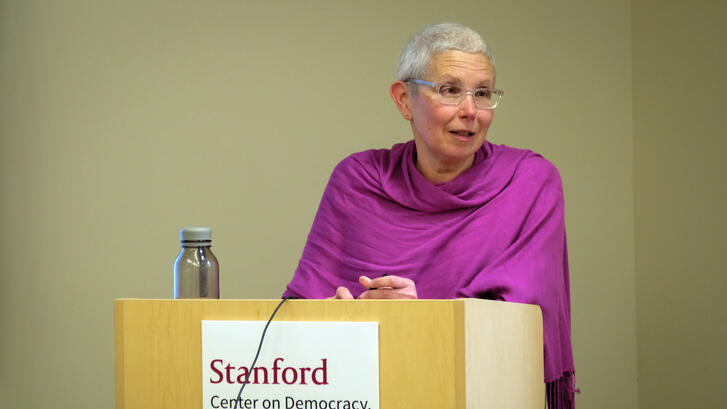MIP's 2025 Capstone Projects Aim for Worldwide Impact
After almost two years of hard work and study, the 2025 cohort of the Ford Dorsey Master's in International Policy program (MIP) is preparing for the final stretch of their learning journey at the Freeman Spogli Institute for International Studies (FSI).
Each year, second-year MIP students participate in the Policy Change Studio, which takes their learning out of the realm of theory and into hands-on, on-the-ground application. Recognizing that the world outside the classroom is much more complex, bureaucratic, and constrained than textbook case studies, the Studio is a two-quarter course designed to provide students with direct experience researching, developing, and implementing policy goals.
Our students are setting out for Belgium, Mongolia, Ghana, Australia, and India to work directly with research groups, NGOs, and policy institutions on pressing challenges affecting local communities and global alliances alike. Keep reading to learn more about each project.
Securing Trust: A Framework for Effective Cyber Threat Information Sharing in NATO
![[Left to right]: Emerson Johnston, Tiffany Saade, Chan Leem](https://fsi9-prod.s3.us-west-1.amazonaws.com/s3fs-public/styles/727x409/public/2025-03/cybernetica.jpg?h=71976bb4&itok=f3lwJ11Y)
gaps persist between stakeholders. This is exacerbated by the lack of clear, standardized specifications from NATO, leading to inconsistent implementation and operational friction. Second, at its core, this is an intelligence-sharing challenge: member states operate under different national frameworks, threat perceptions, and priorities, which influence what information they are willing (or unwilling) to share. Third, the fragmentation of sharing systems is not merely a technical hurdle but often a deliberate choice made for operational and security reasons, reflecting concerns over sovereignty, data protection, and strategic advantage.
While technological advancements can enhance interoperability, they alone will not drive adoption. Our research highlights that the underlying issue is one of trust and incentives—NATO must establish mechanisms that encourage collaboration beyond just technological solutions. Without a strong foundation of mutual trust, transparency, and shared benefits, even the most advanced systems will face resistance. Creating sustainable incentives for participation—whether through policy alignment, risk reduction assurances, or value-added intelligence sharing—will be essential in fostering a more effective and unified cyber defense posture within NATO.
Cultivating Community-Led Policies: GerHub and Mongolia’s Billion Trees Initiative
![[Left to right]: Julia Ilhardt, Serena Rivera-Korver, Johanna von der Leyen, and Michael Alisky](https://fsi9-prod.s3.us-west-1.amazonaws.com/s3fs-public/styles/727x409/public/2025-03/gerhub.jpg?h=71976bb4&itok=ncTsPzeE)
A key component of our project involves conducting in-depth research and stakeholder interviews focused on Mongolia's "Billion Trees Initiative," where we will be seeking actionable insights to scale up the initiative effectively and sustainably.
Countering Coordinated Political Disinformation Campaigns in Ghana
![[Left to right]: Euysun Hwang, Sakeena Razick, Leticia Lie, and Julie Tamura](https://fsi9-prod.s3.us-west-1.amazonaws.com/s3fs-public/styles/727x409/public/2025-03/disinfo_ghana.jpg?h=71976bb4&itok=m0iXK4Et)
influencers work with politicians to coordinate these influence operations and shape public opinion. Our policy recommendations will address how governments and civil societies can work together to tackle this issue.
Orbital Return Policy and Operations in Australia
![[Left to right]: Samara Nassor, Gustavs Zilgalvis, and Helen Phillips](https://fsi9-prod.s3.us-west-1.amazonaws.com/s3fs-public/styles/727x409/public/2025-03/aus_space.jpg?h=0d03432e&itok=CHIkKqEP)
Australian Space Agency and U.S. Defense Innovation Unit, the goal of this project is to leverage Australia's strategic geographic position and investment in reentry infrastructure to mitigate the hurdles that U.S. commercial startups experience accessing military ranges for reentry. Our project aims to create a robust foundation for the development of orbital return capabilities in Australia, fostering greater commercial and national security collaboration between the U.S. and Australia.
Overcoming Computational Resource Gaps for Open Source AI in India
![[Left to right]: Sandeep Abraham, Sabina Nong, Kevin Klyman, and Emily Capstick](https://fsi9-prod.s3.us-west-1.amazonaws.com/s3fs-public/styles/727x409/public/2025-03/digital_futures_lab.jpg?h=71976bb4&itok=irALsTsT)
to computational resources acts as a barrier to adoption. India has a thriving tech sector, and openly available AI models have the potential to democratize access to this trailblazing technology. At the same time, AI is expensive to build and deploy, and access to the specialized computational resources needed to do so is limited even for top Indian companies. Our team aims to develop solutions in partnership with Digital Futures Lab that can help bolster the AI ecosystem across India.
Combating Human Trafficking in the Informal Mining Industry in Ghana
![[Left to right]: Alex Bue, Rachel Desch, and Marco Baeza](https://fsi9-prod.s3.us-west-1.amazonaws.com/s3fs-public/styles/727x409/public/2025-03/cdd_ghana.jpg?h=71976bb4&itok=zmf6_ARg)
that contribute to this issue. During our fieldwork, we will explore community- and government-driven programs aimed at preventing and combating trafficking. Our final report will analyze existing policies, pinpoint gaps, and propose community-led interventions to address them.
The Ford Dorsey Master's in International Policy
Want to learn more? MIP holds admission events throughout the year, including graduate fairs and webinars, where you can meet our staff and ask questions about the program.
Read More
Students in the Ford Dorsey Master's in International Policy program are practicing their policymaking skills through projects on cybersecurity within NATO, countering political disinformation in Ghana, commercial space technology in Australia, and more.




















